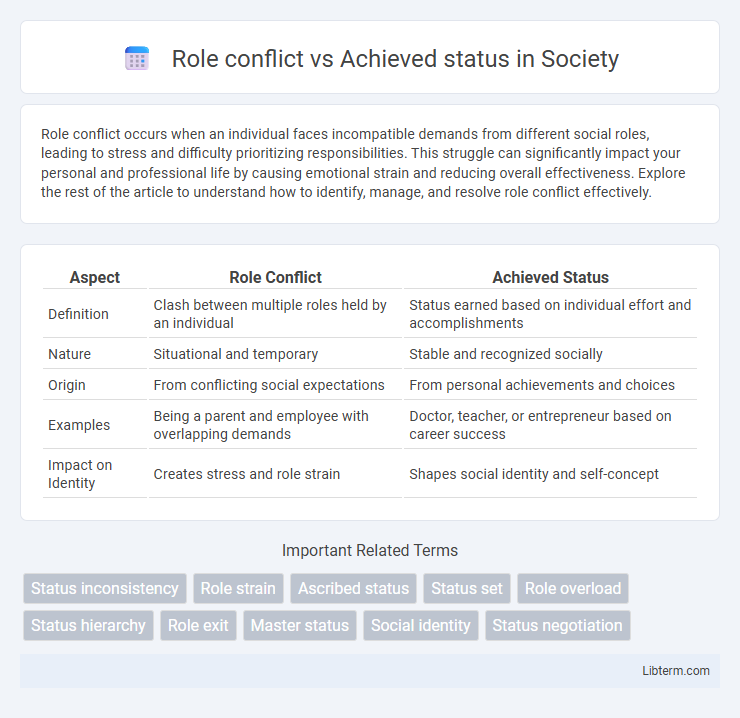Role conflict occurs when an individual faces incompatible demands from different social roles, leading to stress and difficulty prioritizing responsibilities. This struggle can significantly impact your personal and professional life by causing emotional strain and reducing overall effectiveness. Explore the rest of the article to understand how to identify, manage, and resolve role conflict effectively.
Table of Comparison
| Aspect | Role Conflict | Achieved Status |
|---|---|---|
| Definition | Clash between multiple roles held by an individual | Status earned based on individual effort and accomplishments |
| Nature | Situational and temporary | Stable and recognized socially |
| Origin | From conflicting social expectations | From personal achievements and choices |
| Examples | Being a parent and employee with overlapping demands | Doctor, teacher, or entrepreneur based on career success |
| Impact on Identity | Creates stress and role strain | Shapes social identity and self-concept |
Understanding Role Conflict: Definition and Examples
Role conflict occurs when an individual faces incompatible demands from different social roles simultaneously, leading to stress and confusion. For example, a working parent may struggle to balance job responsibilities with childcare, resulting in conflicting expectations from employers and family members. Understanding role conflict helps in identifying areas where competing roles interfere, allowing for better management of social and professional obligations.
Achieved Status: Meaning and Sociological Importance
Achieved status refers to a social position earned through individual effort, skills, or accomplishments, contrasting with ascribed status assigned at birth. This concept highlights personal agency in social mobility and identity formation, emphasizing how education, occupation, and achievements influence societal roles. Sociologically, achieved status plays a crucial role in understanding social stratification and the dynamics of social interaction within diverse groups.
Key Differences Between Role Conflict and Achieved Status
Role conflict occurs when incompatible demands arise from different social roles a person occupies, causing stress and confusion, whereas achieved status refers to a social position gained through individual efforts, skills, or accomplishments. Role conflict is situational and pertains to the expectations tied to multiple roles, while achieved status is a stable social identity reflecting personal success and agency. The main difference lies in role conflict being about conflicting responsibilities within roles, while achieved status emphasizes personal achievement and social mobility.
How Role Conflict Arises from Multiple Achieved Statuses
Role conflict arises when an individual occupies multiple achieved statuses, each demanding different and often incompatible behaviors or responsibilities. For example, a professional who is also a parent may face conflicting expectations between workplace duties and family obligations, leading to stress and decreased performance in one or both roles. Managing these competing role demands requires effective time management and prioritization to minimize conflict and maintain role satisfaction.
Social Identity and the Impact of Role Conflict
Role conflict arises when incompatible expectations from multiple social roles create stress, impeding individuals' ability to maintain a coherent social identity. Achieved status, reflecting accomplishments and choices, influences how individuals navigate and prioritize these conflicting roles. The impact of role conflict often challenges self-concept, leading to identity tension and affecting social integration and psychological well-being.
Role Conflict in Professional vs. Personal Achieved Status
Role conflict arises when the expectations tied to professional achieved status, such as leadership responsibilities, clash with those associated with personal achieved status, like being a parent or caregiver. Navigating the demands of high achievement in both spheres often results in time constraints, stress, and emotional strain, as individuals struggle to fulfill competing roles effectively. Understanding these dynamics is crucial for developing workplace policies and personal strategies that support work-life balance and role integration.
Managing Role Conflict: Strategies and Solutions
Managing role conflict involves balancing competing demands from multiple social roles to minimize stress and enhance performance. Effective strategies include prioritizing roles based on situational importance, setting clear boundaries to prevent overlap, and utilizing time management techniques to allocate sufficient attention to each role. Developing communication skills and seeking social support also play critical roles in resolving conflicts between achieved status expectations and other role responsibilities.
The Influence of Culture on Achieved Status and Role Conflict
Cultural values shape achieved status by determining the criteria for success, such as education, occupation, or family background, resulting in varied perceptions of social mobility across societies. Role conflict arises when individuals face incompatible demands from multiple social positions influenced by cultural expectations, leading to stress and identity negotiation. Societies with collectivist cultures often experience heightened role conflict due to overlapping social roles and obligations, whereas individualistic cultures emphasize distinct achieved statuses that may reduce such conflicts.
Real-World Case Studies: Navigating Role Conflict and Achieved Status
Real-world case studies reveal how individuals balancing role conflict often negotiate their achieved status by prioritizing roles that align with personal aspirations or societal expectations. For instance, working parents managing career demands and family responsibilities demonstrate role conflict while striving to maintain an achieved status of professional success. These examples highlight the dynamic interplay between social roles and achieved status in constructing personal identity and social positioning.
Future Trends: Evolving Roles and Status in Modern Society
Future trends indicate that role conflict may intensify as individuals juggle multiple social identities and professional demands in increasingly complex online and offline environments. Achieved status will continue to evolve through digital credentials, remote work, and gig economy participation, reshaping traditional markers of success and social standing. Technological advancements and shifting cultural norms drive dynamic changes in how roles and statuses are negotiated and perceived in modern society.
Role conflict Infographic

 libterm.com
libterm.com